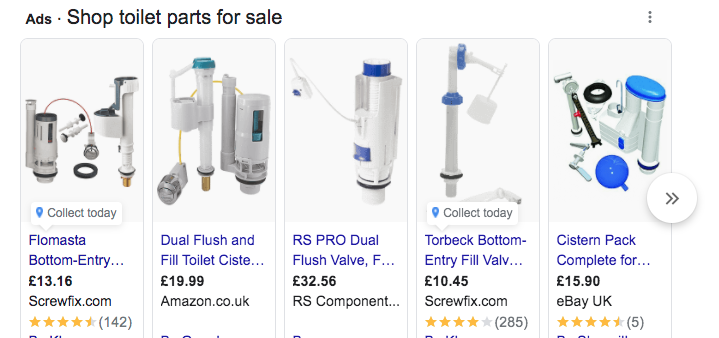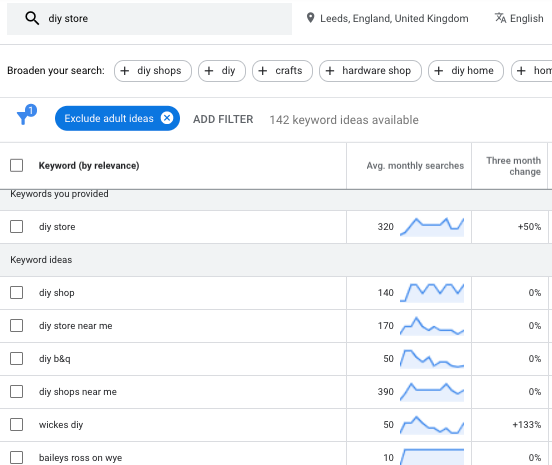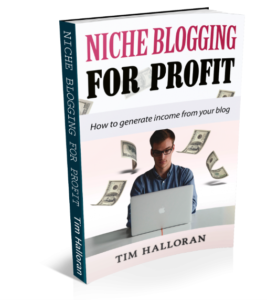The definition of intent based marketing is directing marketing campaigns at people whose online behaviour shows purchase intentions. A simple example might be to create online content which reviews a certain product. People often look for reviews just before making a purchasing decision. They just want some last piece of information on a product before they buy. So as a content marketer, you can create content which attract this kind of user intent.
If you’re using paid marketing tactics to promote your product or service, you will want to learn about search intent. With Google’s Adwords paid marketing platform, for example, your adverts will only show for the keywords you target with your campaigns. An example of a search which doesn’t show buying intent might be “how to fix a broken toilet”. This kind of search shows an intent to fix a toilet but not to purchase something.

The person may of course buy something they need relating to the broken toilet and your website might make sales of parts to help solve the problem. But the search intent is about finding information, not making a purchase.
Once they have found the solution, their search might be “toilet parts for sale”, for example. This search shows an intent to buy something specific. They might even do a specific search of a particular toilet part that they need;”Buy cistern pack”, for example.
Why Intent Based Marketing Matters For Affiliates
Intent based marketing is important for all kinds of marketers. With the wrong kind of content on your website, or advertising campaign, you can easily attract the wrong kinds of visitors. So even a tonne of traffic won’t convert into happy customers if you don’t target the right kind of visitors!
In order to get good at targeting the right people for your business, or product you need to learn about your perfect target audience. Without understanding who is your best customer, it can be easy to work in the wrong direction. Your “best” customer is your customer avatar.

Imagine your perfect customer. They love what you do so much they will buy everything you sell and become a life long consumer of your products/service. That’s your perfect customer. You may even have a customer like this already. If so, use them to identify the traits of your customer avatar. Knowing your customer avatar well is the best thing you can do to target them in your advertising.
Customer Avatar
Why does your customer avatar matter and how do you get to know your target market? Simply because your perfect customer will spend more with your company than anyone else. So why waste time and advertising budget putting your message in front of anyone else?
Lets say you own a DIY store. Your “perfect” customer lives within 5 miles of your store, and is over 30 years old. You do of course have customers who are younger, and who travel further, but most of your customers fall into that location and age bracket. So when running your marketing campaign, you can specify those particular terms so your advert shows only to people within that category: within 5 miles of your location and over 30 years old!
If you’re running a Google Ad, you will want to look at the keyword planner to see exactly the kinds of searches which are being looked for in your local area.

With Google Ads, you can specify location, age, keywords and a host of other criteria. But to do this accurately you’ll need to spend some time getting to know who is right for your business, and where to spend your money! Without location targeting setup for a local business, you can easily waste money putting your advert in front of people who will never visit your store!
Content Marketing
Creating content takes a lot of time and effort. Ultimately you want your time/effort to be well rewarded. So when creating content for the purposes of marketing something, you will want to know the intent behind someone looking for your specific piece of content.
Why spend heaps of time creating content which will only be found by “tyre-kickers” or “freebie” seekers?!

To avoid falling into this trap, before creating content think about who your audience is. Then look for keywords which your audience is searching for online (using the keyword planner). Target buyer keywords rather than “how to” keywords for a more focused audience.
Of course with content creation, it isn’t always possible to get your content found for competitive terms, especially if you’re relying on SEO (search engine optimisation). But knowing your customer “avatar” will help you write/create with them in mind.
See also why is target market important.